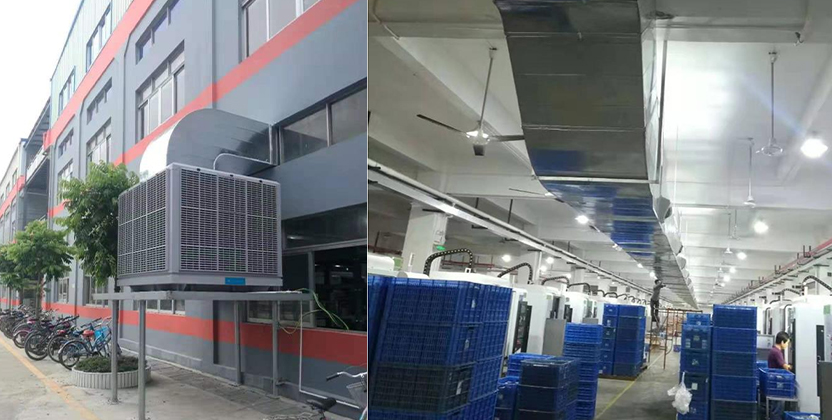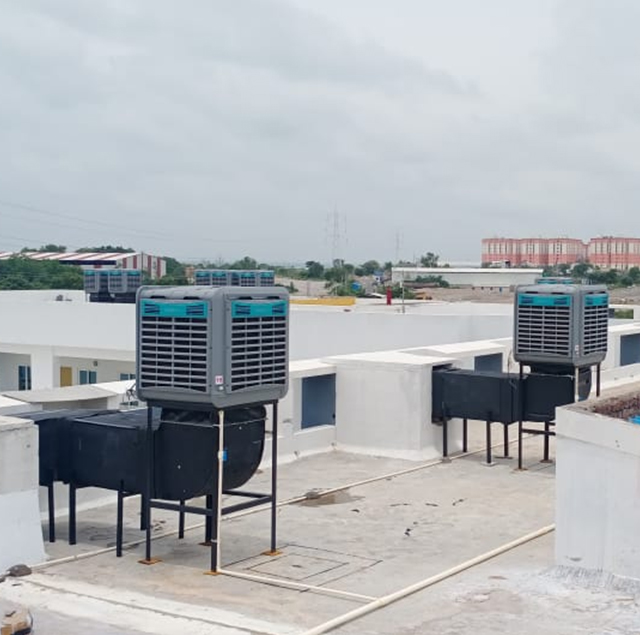Air Coolers vs HVAC in India's Commercial & Industrial Sectors

A Paradigm Shift in Commercial and Industrial Cooling
The debate between air coolers and HVAC (Heating, Ventilation, and Air Conditioning) systems has persisted for decades, particularly in commercial and industrial applications. While HVAC systems have traditionally been the go-to solution for indoor climate control, the rise of air cooler technology marks a shift toward smarter, more sustainable, and cost-effective solutions. As businesses and industries continue to evolve, the demand for energy-efficient and environmentally responsible cooling methods grows. In India, where temperatures soar, air coolers are emerging as the preferred alternative, especially in commercial and industrial sectors. Let’s look into why air coolers are increasingly being chosen over HVAC systems, exploring industry trends, long-term benefits, and what sets air coolers apart.
Air Coolers: A Legacy of Efficient Cooling
The concept of evaporative air cooler is not new. In fact, it's an age-old technology that has been refined over the years to deliver exceptional cooling performance. Historically, civilizations across the world, including in India, relied on passive cooling techniques such as using water to regulate temperature. Over time, this evolved into modern air coolers that use the same principle—evaporation of water to cool the air.
Global Trend: The Shift towards Sustainable Cooling Solutions

Worldwide, the trend of moving away from energy-intensive air conditioning systems toward more sustainable alternatives is gaining traction. Countries like Australia, Spain, and even parts of the United States have incorporated air coolers in their industrial and commercial spaces due to their energy efficiency and lower environmental footprint. In fact, reports from the International Institute of Refrigeration indicate that evaporative cooling could reduce energy consumption by up to 75% compared to traditional HVAC systems in dry climates.
In India, the adoption of air coolers is particularly suited to the regional climate. The majority of India's cities experience hot and dry conditions for most of the year, making air coolers the ideal solution. HVAC systems, on the other hand, are inefficient in such environments, consuming significantly higher energy for cooling that is less effective due to the humidity levels.
Why Air Coolers Stand Strong in India’s Commercial and Industrial Spaces
1. Energy Efficiency & Cost Savings: The Key Advantage
- Air coolers consume a fraction of the energy that HVAC systems use. A typical air cooler uses about 1/10th of the power compared to an air conditioning system. In commercial and industrial settings, this can translate to substantial cost savings over the long term, especially when cooling large spaces such as warehouses, factories, and distribution centers.
- According to the Bureau of Energy Efficiency (BEE) in India, adopting air coolers instead of HVAC systems can result in up to 70% savings in energy consumption, an attractive proposition for businesses looking to cut operational costs.
2. Long-Term Operational Benefits
- The longevity of air coolers is another compelling factor. HVAC systems require regular maintenance, including refrigerant refills, filter changes, and high-cost repairs, which adds to the operational costs. In contrast, air coolers are relatively low-maintenance, with only the cooling pads needing periodic replacement, and minimal electrical components to service.
- With fewer moving parts and no complex refrigeration systems, air coolers are less prone to breakdowns, thus ensuring continuous operation with fewer interruptions and lower maintenance costs over time.
3. Sustainability and Environmental Impact
- The environmental benefits of air coolers are undeniable. While HVAC systems rely on refrigerants that contribute to global warming and ozone layer depletion, air coolers use only water and air, making them a much more eco-friendly choice. As industries across India adopt greener technologies, air coolers align perfectly with the move toward reducing carbon footprints.
- Air coolers also contribute to a healthier environment by ensuring the introduction of fresh, filtered air into indoor spaces. In contrast, HVAC systems often recycle indoor air, which can lead to poor air quality over time.
The Evolution of Air Cooler Technology: From Basic to Advance
While air coolers of the past were simple devices with limited cooling capacities, modern air coolers have undergone significant advancements. The integration of Intelligent Airflow Technology (IAT), Automatic Humidity Control, and Smart IoT Features has made air coolers far more efficient and adaptable to the needs of modern industries.
- Intelligent Airflow Technology (IAT): Today’s air coolers are designed with advanced airflow management systems that ensure optimal cooling across large spaces. These systems allow for uniform distribution of cool air, reducing hot spots and improving comfort levels within industrial and commercial environments.
- Smart Features: Modern air coolers come equipped with smart controls, including app-based interfaces, remote monitoring, and automatic settings, which provide convenience and flexibility for businesses managing large cooling systems.
Air Coolers vs. HVAC Systems: Which is the Right Choice for Businesses?
- Installation and Maintenance: Installing HVAC systems involves complex ductwork, refrigeration units, and significant upfront costs. In contrast, air coolers can be installed much faster and with less disruption to daily operations. Their modular design also allows for scalability, making them ideal for businesses that may need to expand their cooling requirements over time.
- Operating in Extreme Conditions: HVAC systems struggle in extremely hot, dry conditions, where the heat load can overwhelm the air conditioning system, leading to inefficiency. Air coolers, on the other hand, are designed specifically for such conditions, offering a consistent and efficient cooling performance, even in harsh climates.
- Low Operating Costs: The total cost of ownership for air coolers is significantly lower than HVAC systems. Over time, the savings in electricity bills, reduced maintenance costs, and lower environmental impact make air coolers the clear choice for many industries, especially in India's cost-sensitive business environment.
Why the Air Cooler Technology is Here to Stay
Air cooler technology’s success in India’s industrial and commercial sectors is not a passing trend. With India's relentless summers and growing demand for cost-effective, environmentally friendly solutions, air coolers are emerging as the cooling method of choice.
The ability of air coolers to provide energy-efficient, sustainable, and low-maintenance cooling makes them a timeless solution for both commercial and industrial spaces. The shift toward air coolers is not only driven by cost savings but also by their ability to meet the modern-day demands for greener and more responsible business practices.
Conclusion: Embracing the Future of Cooling Solutions in India
As industries across India look for ways to enhance efficiency while lowering costs and environmental impact, air coolers present a future-proof solution that is adaptable, sustainable, and technologically advanced. For businesses seeking long-term benefits and optimal cooling performance, air coolers offer an unbeatable combination of cost efficiency, sustainability, and superior air quality, all of which are essential for thriving in India’s commercial and industrial landscape.
As industries across India look for ways to enhance efficiency while lowering costs and environmental impact, air coolers present a future-proof solution that is adaptable, sustainable, and technologically advanced. For businesses seeking long-term benefits and optimal cooling performance, air coolers offer an unbeatable combination of cost efficiency, sustainability, and superior air quality, all of which are essential for thriving in India’s commercial and industrial landscape.


